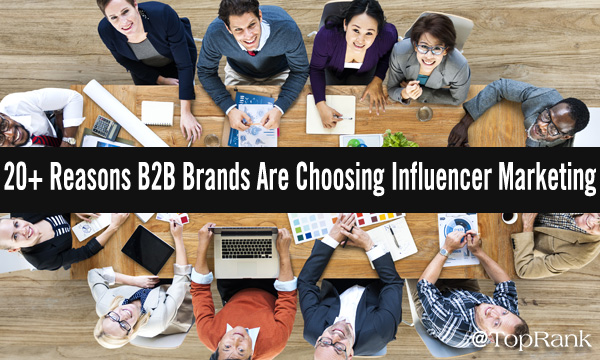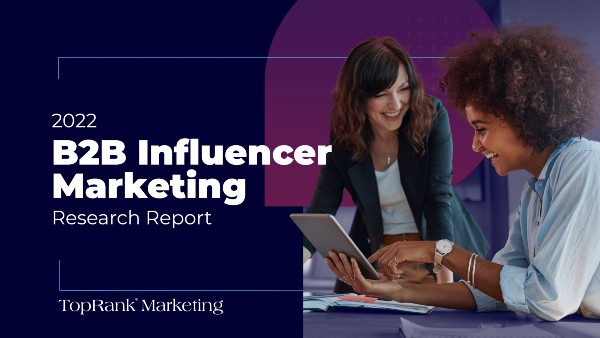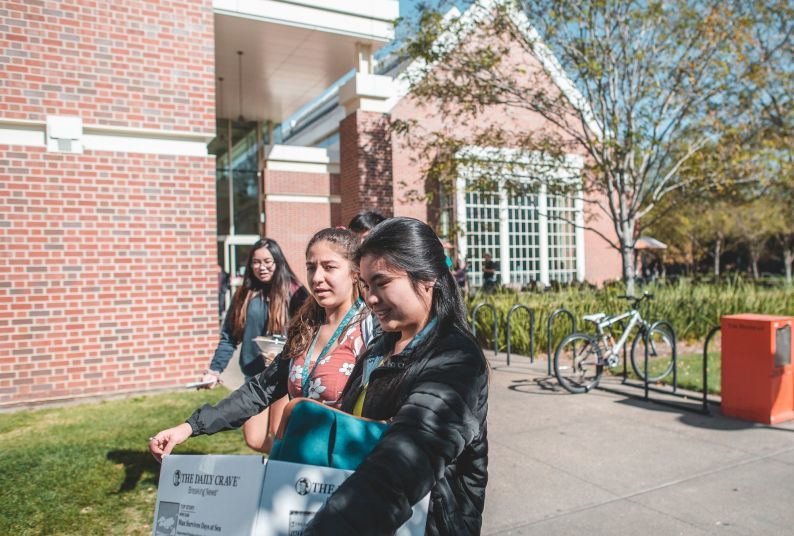
Why are B2B brands increasingly turning to influencer marketing?
B2B influencer marketing is the business-oriented cousin to the B2C Instagram entertainment and lifestyle influencer. In B2B, some influencers go by creators, subject matter experts, industry experts, or other terms that disassociate them from the B2C influencer.
Whichever term is used, B2B influencer marketing provides an ideal way to combat disintegrating brand trust, so it’s no wonder that by the end of 2022 the B2B influencer marketing vertical is expected to reach $11.7 billion in revenue, with over 38 percent of B2B firms exploring influencer marketing for lead-generation and more, according to AdAge.
B2B influencer marketing is a many-faceted digital diamond that when done well shines brightly, however brands need to be wary of treating it like its vastly different B2C counterpart.
Let’s take a look at 20-plus advantages that B2B influencer marketing holds over traditional marketing strategies.
B2B Influencer Marketing Offers Key Advantages
New analysis published in the Harvard Business Review has shown that average brand boost could reach 16.6 percent by properly utilizing influencer marketing, with influencer originality accounting for a 15.5 percent rise in return on investment (ROI).
B2B marketers have said that influencer marketing will be among their three top priorities in the next three to five years, as 59 percent of marketing leaders noted that they considered B2B influencer marketing a priority today, and 64 percent pinpointing it as a top priority over the upcoming three to five years, according to recently-released survey data from the Association of National Advertisers (ANA).
The academic world has also begun to take notice of the power of B2B influencer marketing, such as the comprehensive “B2B Influencer Marketing: Conceptualization and Four Managerial Strategies” study recently-published by Science Direct / Elsevier, including numerous citations to our own groundbreaking first industry B2B Influencer Marketing Research Report.
Social media publications are also increasingly becoming aware of B2B influencer marketing, such as Social Media Today’s recent article “15 Ways the B2B Influencer Marketing Industry is Changing [Infographic],” featuring our own latest infographic filled with data from our newest free 59-page 2022 B2B Influencer Marketing Research Report.
Influencer marketing has emerged as a key way that B2B brands can get the most marketing bang for their buck and help recession-proof marketing strategy. U.S. organizations are expected to spend $6.16 billion on influencer marketing during 2023, climbing from the $5 billion seen during 2022, as influencer marketing has been more resilient than other forms of marketing, with influencer marketing budgets staying strong, according to recently-published forecast data from Insider Intelligence.
Enduring Relationships & Increased Thought Leadership
B2B influencer marketing helps build successful and lasting relationships, as our CEO Lee Odden recently explored in a fascinating podcast with Justin Levy, director of social and influencer marketing at Demandbase, in “The Impact of Building Long-Term Relationships with Influencers with Lee Odden.”
42 percent of organizations with more than 1,000 employees work with influencers and creators, while only 28 percent of smaller businesses with under 100 workers do, according to Hootsuite’s newly-released annual social trends report. 2023 is likely to see more B2B organizations of all size either expand their existing influencer programs or beginning their first.
B2B influencer marketing helps improve brand reputation and awareness, as well as generating new leads, as diginomica recently explored in “Influencer Marketing – first, catch your influencer…,” also featuring data taken from our most recent research report.
B2B influencer marketing offers an ideal framework for successful content planning, creation, and promotion, as we covered recently in “Planning, Creation & Promotion: 5 Top Tactics For Creating Inspired B2B Content.”
B2B influencer marketing can have a direct impact on building thought-leadership and executive influence, and the time to redefine influencer marketing may have arrived, as our own senior content marketing manager Joshua Nite has explored in “How to Create More Authentic Influencer-Driven Content to Attract Qualified Prospects.”
“In our survey, over half of respondents said they included internal executives in their influencer content. Nearly half said they included their employees as well. This is a clear opportunity to create more valuable content and build your organization’s thought leadership at the same time,” Joshua observed.
“It’s time to redefine influence. Your most valuable prospects are looking to industry leaders, practitioners and peers for advice. Your team can deliver all of the above with the right mix of influencers,” Joshua added.
“It’s time to redefine influence. Your most valuable prospects are looking to industry leaders, practitioners and peers for advice. Your team can deliver all of the above with the right mix of influencers.” — Joshua Nite @NiteWrites Click To Tweet
B2B Influence Creates Meaningful Brand Experiences & Builds Trust
When it comes to creating meaningful brand experiences and authentically connecting with buyers, B2B influencer marketing has found growing success. “In times like these, the importance of influence is critical for B2B brands that need to connect authentically with their buyers and create meaningful experiences,” Lee observed in our “2022 B2B Influencer Marketing Report: New Data, Insights, Case Studies, Predictions.”
“In times like these, the importance of influence is critical for B2B brands that need to connect authentically with their buyers and create meaningful experiences.” — Lee Odden @LeeOdden Click To Tweet
Social media platforms have proven to hold both influence and attention, while the influencer economy has gained precedence as a top form of customer communications, as B2B brand content creators increasingly become the faces of the brands they represent, as Talkwalker recently covered in its Social Media Trends 2023 Global Report.
“Content creators will become the faces of the brands they represent, especially in B2B. People trust people more than companies. Expertise is key to building trust with your audience,” Daniel Murray, founder of The Marketing Millennials observed.
“Content creators will become the faces of the brands they represent, especially in B2B. People trust people more than companies. Expertise is key to building trust with your audience.” — Daniel Murray @Dmurr68 Click To Tweet
Dispelling The Boring-To-Boring Myth & Boosting Engagement
The type of digital experiences that work so well within a B2B influencer marketing framework go a long way towards dispelling the longstanding notion of B2B being nothing but boring-to-boring, as Lee detailed in the recent “Break Free of Boring B2B with Influencer Content Ft. Lee Odden” episode of The Data-Driven Marketing podcast with host Mark Richardson, director of global content operations at Dun & Bradstreet.
The popularity of influencer marketing is on the rise, as 85 percent of respondents to our extensive survey expect activity to increase over the next year, with B2B marketers increasing their level of maturity and sophistication and shifting towards always-on, relationship-based influencer communities. You can take an eye-opening look at the future and power of B2B influence from 10 of the world’s top experts and influencers in our “10+ B2B Influencer Marketing Predictions From Top Experts & Influencers.”
(Click Through For More Predictions)
B2B influencer marketing also helps when it comes to boosting content engagement. In fact, 32 percent of marketers and influencers have said that influencer marketing has increased engagement, while 65 percent of marketers said that influencer marketing works more often than it fails, recent data has shown.
Additionally, 30 percent of consumers have reported that recommendations from influencers are among the most important factors in purchase decisions — more than the 27 percent who pointed to friends or family, while an upcoming greater reliance on influencers has joined greater adoption of virtual reality (VR) and augmented reality (AR), according to HubSpot’s look at the future of social media.
B2B Influence Will See Increasing Use Among Brands in 2023
While this list of more than 20 of the reasons why B2B brands are increasingly moving to influencer marketing only scratches the surface, 2023 is certain to see new takes on B2B influencer marketing that we can’t yet set, however by keeping on top of the most recent industry shifts, we’ll be better prepared for what the coming years hold in store.
Especially with B2B influencer content, crafting award-winning B2B marketing that elevates, gives voice to talent, and humanizes with authenticity takes considerable time and effort, which is why more brands are choosing to work with a top digital marketing agency such as TopRank Marketing. Reach out to learn how we can help, as we’ve done for over 20 years for businesses ranging from LinkedIn, Dell and 3M to Adobe, Oracle, monday.com and many others.










